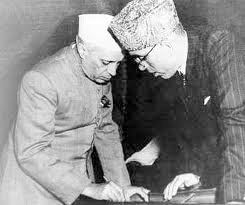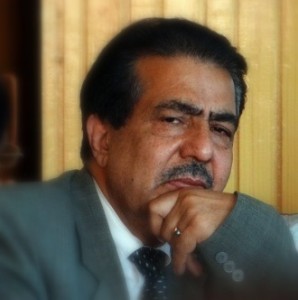Peace Watch » Point of view » Understanding Importance of 35 A To Demography Of Kashmir
Understanding Importance of 35 A To Demography Of Kashmir
Article 35-A in peril
Need to safeguard our constitutional right
Abdul Majid Zargar

 After repeated adjournments, Supreme Court of India is finally expected to hear the arguments in respect of Article 35A on 6th of August 2018. In July 2014, soon after BJP was elected to power in New-Delhi, an RSS backed Non-Governmental organization, “We the citizens”, filed a petition in the Supreme Court challenging the validity of this article on the ground of its having been inserted in the Indian constitution through a presidential order rather than after complying with the elaborate procedure prescribed under article 368 of Indian constitution. The hint of such an action had been given by Arun Jaitley an year earlier, in a seminar held in South India.
After repeated adjournments, Supreme Court of India is finally expected to hear the arguments in respect of Article 35A on 6th of August 2018. In July 2014, soon after BJP was elected to power in New-Delhi, an RSS backed Non-Governmental organization, “We the citizens”, filed a petition in the Supreme Court challenging the validity of this article on the ground of its having been inserted in the Indian constitution through a presidential order rather than after complying with the elaborate procedure prescribed under article 368 of Indian constitution. The hint of such an action had been given by Arun Jaitley an year earlier, in a seminar held in South India.
Subsequent to this petition, three more classes of persons have joined the chorus by filing separate petitions challenging the validity of this article on ground or the other. Charu Wali Khanna, a lawyer and former member of the National Commission for Women, has challenged this Article as also Section 6 of the Jammu and Kashmir Constitution( which deals with the “permanent residents provisions ” of the state) on the ground that these deny property right to a woman and her childred marrying a person from outside the state. Similarly West Pakistan refugees have challenged this on the ground of discrimination in spheres like acquisition of property, service & voting rights. And lo & behold-a section of safaikaramcharis, known as Valmikis whose services were requisitioned by our State from neighbouring state of Punjab in 1957, following a strike by State Karamcharis of Jammu in that year, have challenged the article on the ground that it comes in their way of acquiring a permanent residence after staying in the State for a considerable period of time. The Court has clubbed all these petition with the main petition filed by RSS backed NGO. In effect, the court will not only have to decide the validity of the article on procedural aspect but also to decide that the article doesn’t violate fundamental rights of Indian citizens enshrined in article 14, 19 & 21 of Indian constitution. There should be no doubt in anybody’s mind that it is a carefully & cleverly laid judicial trap by the present ruling dispensation in New-Delhi to denude the State of J&K of whatever remains of the special status and change its demographic character to submerge it in the ocean of Indian people.
In 1947,When the State entered into a conditional & limited accession with the union of India, a temporary governing mechanism was devised in the shape of Article 370. This article required New-Delhi to consult J&K State for extending laws pertaining to three subjects of defence, foreign affairs & communication(as specified in the instrument of accession) and her concurrence for application of laws on subjects other than the above three. Not content with the above limitations, Delhi always wanted more powers to strengthen her foothold in the State. This resulted in further negotiations between New-Delhi & Srinagar culminating in Delhi Agreement of 1952. While more powers were conceded to centre in this agreement, a concession to protect her own hereditary state subject laws was acknowledged by New-Delhi by promising adequate constitutional protection. This is clear from Indian Prime Minster Nehru’s following record of talks which he subsequently reiterated before Parliament in debates as well as replies to questions.
“ On 20th July 1952, I met a Kashmiri delegation comprising Sheikh Saheb, Mirza Afzal Beg, Bakshi Ghulam Mohammed, Girdharilal Dogra and D.P. Dhar. The Kashmir delegation were anxious that the rights and privileges given to ‘State subjects’ (Jammu and Kashmir Notification dated 20th April 1927) should be preserved, subject to such variations as the Constituent Assembly of the State might decide upon. These rights and privileges relate more specially to the acquisition and holding of immovable property, appointment to services, etc. It was agreed therefore that: ‘The State Legislature shall have power to define and regulate the rights and privileges of the permanent residents of the State, more especially in regard to the acquisition of immovable property, appointments to service and like matters. Necessary protection would be afforded by the centre. Till then, the existing State law would apply.’
This protection finally culminated in the shape of Article 35A to be inserted in Indian constitution. Opinion of then Attorney General of India, M.C.Stelvad was sought about the constitutional validity of this article and the route to be adopted for its insertion in Indian constitution i.e whether the article should be inserted through a presidential order under article 370 or through the procedure prescribed under article 368 of Indian constitution. Stelvad, an eminent jurist who had earlier worked with the Radcliffe Tribunal for demarcation of the India-Pakistan border and also attended several UN proceedings on Kashmir was of the opinion that the article was constitutionally valid & advised that the best course was to insert it through a presidential order rather than via article 368 route due to lack of legislative competence of Parliament to make laws in respect of J&K outside the three subjects specified in the instrument of accession. His detailed & robust opinion contained in more than fifty pages is supposed to be a marvelous piece of professional opinion & advise in respect of Article 35A. But this opinion preserved in a file in the Home Minstry is now stated to be missing from the safe vaults of Union home Minstry.( https://www.telegraphindia. com/1170820 /jsp/frontpage/story_168196.jsp). It defies logic as to how such an important file can go missing from the safe vaults of Home Minstry, unless of-course, the plan is to keep it away from the apex court’s scrutiny & assistance.
Having said that, It needs to stated here that Indian media presents this article as something which bestows various rights, privileges & favors on people of Kashmir. There can be nothing further from truth when it is repeatedly said & fed to Indian public that article 35A grants property & employment right to people of Kashmir to the exclusion of other Indians. Unfortunately our own media, uses a language at times, which lends credence to this impression.
It must be made very clear that article 35A per se, does not grant or confer any new right to people of Kashmir either with regard to ownership of property or to employment in state services etc. They had such rights even before the India of today came into existence in 1947. Precisely from 1927 onwards, when the Dogra ruler passed state subject law, bestowing such rights on natives, albeit at the instance of Kashmiri Pandits & Jammu Dogras, who always feared influx of people from neighboring plains to overwhelm them. It is also clear from a plain reading of article 35A reproduced below: “Notwithstanding anything contained in this Constitution, no existing law in force in the State of Jammu and Kashmir ——–“ The words ‘Existing law’ is in itself an acknowledgment that no new right or privilege is being bestowed on people of State but only a protection is being afforded to their existing laws.
During the hearing of case on previous occasions, The BJP Government in New-Delhi, tied by its political & ideological stand, opted not to contest it. It neither filed any counter-affidavit nor advised the Advocate General to rebut the contentions raised in the original or subsequent petitions. Since then the elected Govt of J&K state has resigned & state has come under Governor’s rule. The Governor being a representative of the centre and bound by its advice, there is an apprehension that he will toe the centre’s line of no-defense or at best put a weak defense. Under these circumstances the best option for the supreme court will be to adjourn the case till a proper political Govt. is in place in Srinagar and the missing file containing the opinion of then Attorney General of India is located & made available to the Apex Court. Justice must not only be done but it must also appear to have been done.
(The author is a practicing Chartered Accountant.
First Published in Greater Kashmir on 27 July 2018
Filed under: Point of view







